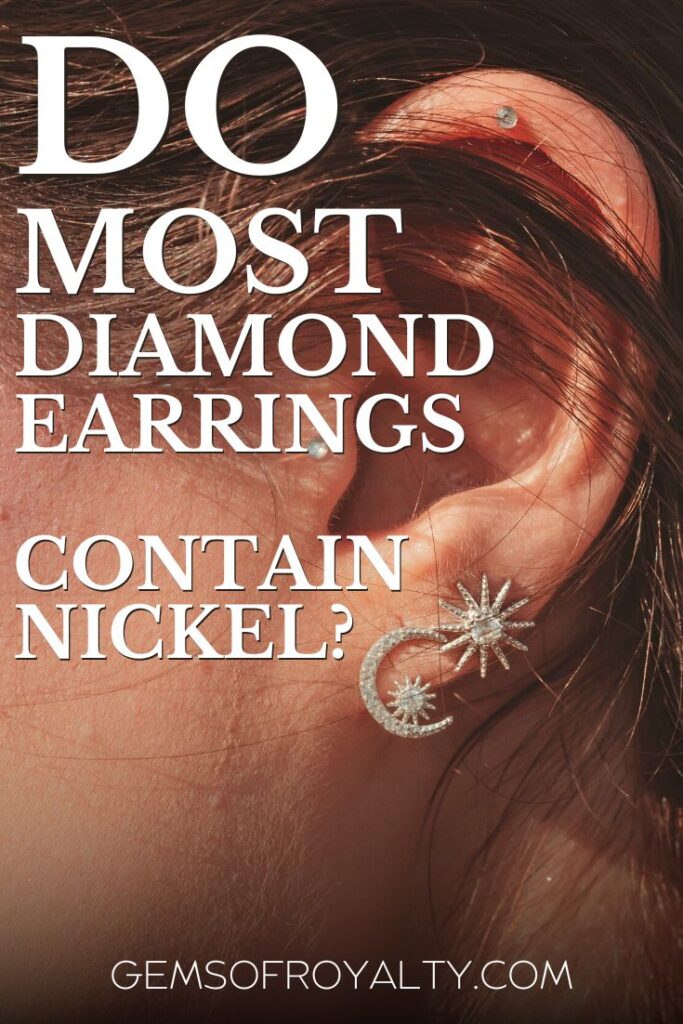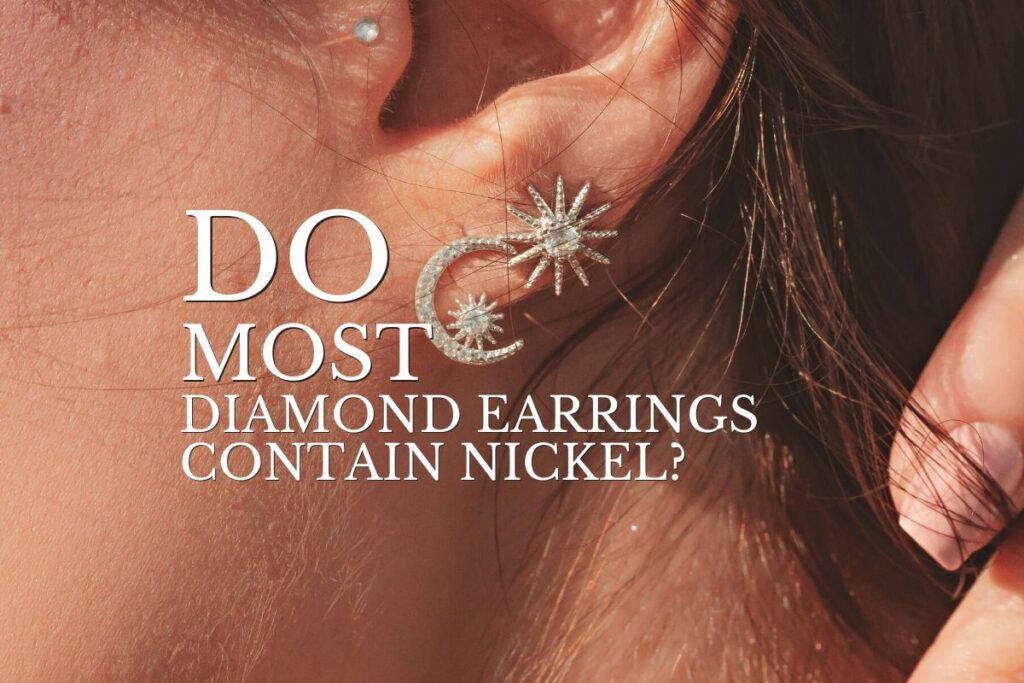Nickel is probably the most prevalent metal in jewelry, such as white gold, gold, and titanium. It plays an important part in the composition of base metals, but many people tend to be allergic to it. So what about diamond jewelry, like earrings?
Most, if not all, diamond earrings contain nickel because pure diamonds have a nickel concentration of at least 0.01% in their composition. Additionally, nickel is used to grow synthetic diamonds, the type of diamonds usually used in jewelry.
So, why is nickel commonly found in diamond jewelry, especially earrings? Is this a bad thing? Find out more in the following sections.
Why Nickel is Common in Diamond Earrings
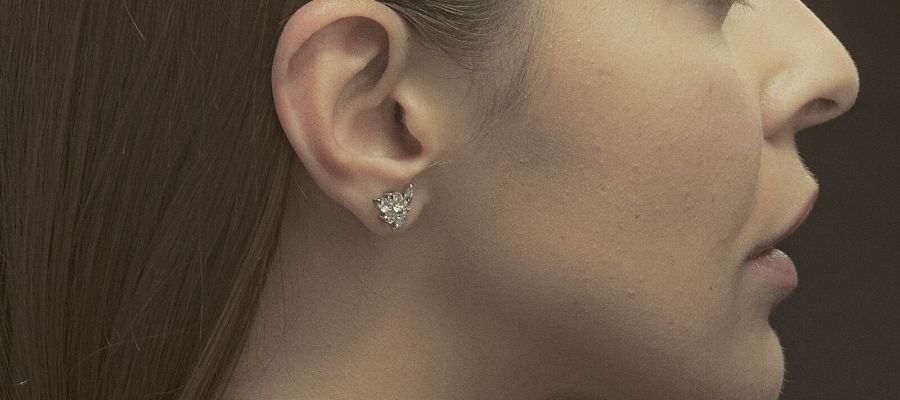
Nickel is common, if not always present, in diamond earrings and other diamond jewelry. It naturally occurs in a diamond’s atoms.
At the same time, nickel is used to grow synthetic diamonds for jewelry, industrial needs, and the like. These are the main reasons you’ll always encounter nickel whenever you wear diamond earrings.
Pure Diamonds Have Concentrated Amounts of Nickel in Their Atoms
A 1998 study regarding diamonds and materials found that the individual atoms of a diamond contain traces of nickel and cobalt. They come in extremely low concentrations, with nickel amounting to only 0.01%.
You should expect your pure diamond earrings to have nickel in them. Despite the low concentration, it can still cause allergic reactions in those with sensitive skin.
Nickel Is Used To Grow Synthetic Diamonds
Synthetic diamonds or lab-created diamonds are created in an artificial environment. They are, however, authentic and natural diamonds.
For these to be grown, graphite is dissolved alongside a solvent-analyst. Options include cobalt, nickel, and iron, but when it comes to jewelry like earrings, nickel is the most commonly used.
Therefore, after the process, it’s a given that the lab-grown diamonds come with traces of nickel.
Nickel-free diamond earrings are extremely rare, that is, if they even exist. Moreover, only an expert jeweler can tell you whether or not a certain piece of diamond jewelry contains the said metal.
Is It Bad if a Diamond Earring Contains Nickel?
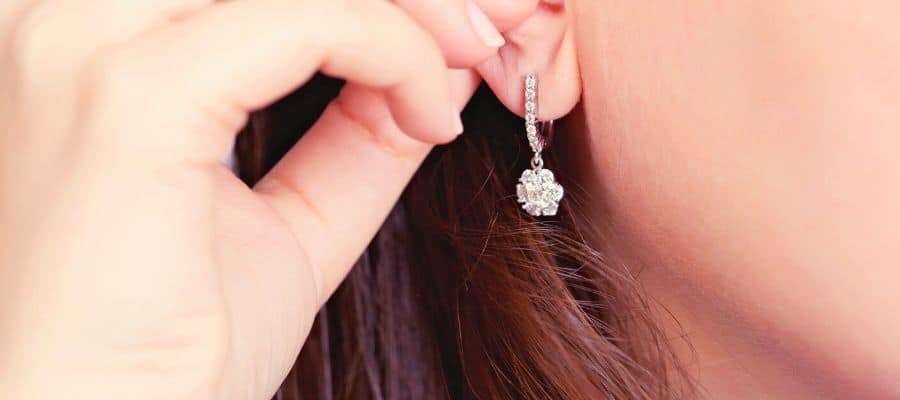
It’s not necessarily bad if a diamond earring contains nickel. However, we still have to take certain factors into account.
For one, are you allergic to nickel? If your answer is yes, then avoiding diamond earrings and other jewelry containing nickel will be your best choice.
Some other things you should consider are the amount or concentration of nickel in the earrings. Cheaper and poorly made pieces will likely have higher concentrations of nickel.
If it’s a new jeweler in town or you think the jewelry store is shady, it’s best to ask if the earrings have nickel and how much is in them. I recommend investing in a high-quality pair of earrings from a well-known jeweler.
Can You Still Wear Your Diamond Earrings if You Have a Nickel Allergy?
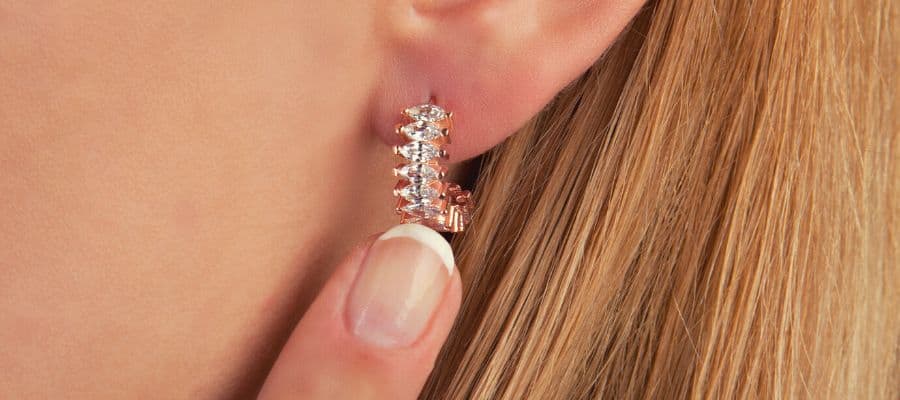
Avoid wearing diamond earrings if you’re allergic to nickel and especially sensitive to it.
Setting the earrings aside is particularly important if your diamond earrings are your everyday earrings. Forcing them on you will only put you at a higher risk of more severe allergic reactions and infections.
If not wearing the earrings is not possible for any reason, there are a few hacks that you can try.
One of the easiest and most affordable involves coating the earrings with clear fingernail polish. The nail paint will be a barrier between the jewelry and your skin.
Just be aware that you’ll have to coat the earrings completely to prevent unwanted contact between your skin and the nickel. Additionally, applying nail polish may affect the value of your diamonds, so be clear about your priorities — do you want to wear the earrings regularly? Or would you prefer to keep them aside for their resale value?
You can also cover the earrings with polycarbonate plastic, a plastic cover made especially for studs. The latter may not work if you have big earrings, though. Your piercings will also need to be stretched slightly to accommodate the plastic cover, so wearing earrings with the cover might feel uncomfortable.
Nickel-Free Metals You Should Try if You’re Allergic to Diamond Earrings

There are several other types of jewelry that you can consider if you’re allergic to nickel.
- Sterling Silver. Sterling silver earrings are stylish and can last long, provided that you take care of them properly. It’s an alloy and doesn’t contain nickel, so you don’t have to worry about getting an allergic reaction.
- Palladium. White gold usually contains nickel. But if you like white gold, I highly recommend purchasing palladium white gold earrings. They’re hypoallergenic, nickel-free, and make very elegant jewelry.
- Platinum. Platinum earrings can get expensive, but you’ll surely get your money’s worth. Not only is it nickel-free, but it’s also resistant to tarnish, discoloration, and corrosion.
- Rhodium. Rhodium earrings are another premium choice for hypoallergenic and nickel-free metals. If your only concern with letting go of diamond earrings is you’ll be losing value, rhodium will be your best alternative.
- Medical-Grade Plastic. Looking for an affordable option for your nickel-free needs? Medical-grade plastic earrings are the way to go, especially for children.
Whatever you choose to invest in, make sure to buy nickel-free earrings. Hypoallergenic ones are good, but they can still contain low amounts of nickel and other allergens. So you’ll be safest looking for jewelry specifically described as nickel-free.
Final Thoughts
Bad news for diamond earring lovers with nickel allergies — most diamond earrings contain nickel because of the mineral’s composition. Whether you’re looking at an earring that uses natural diamonds or a synthetically grown one, expect that they come with nickel. The only thing that will differ is the concentration level of the metal.
Nickel isn’t necessarily bad, but if it’s one of your allergens, it’s best to opt for either hypoallergenic or nickel-free earrings. Choose from sterling silver, palladium, platinum, rhodium, and medical-grade plastic jewelry. You can also ask for advice from your local jeweler to be sure.
If you found this article useful, make sure you save this pin below to your Jewelry board.
